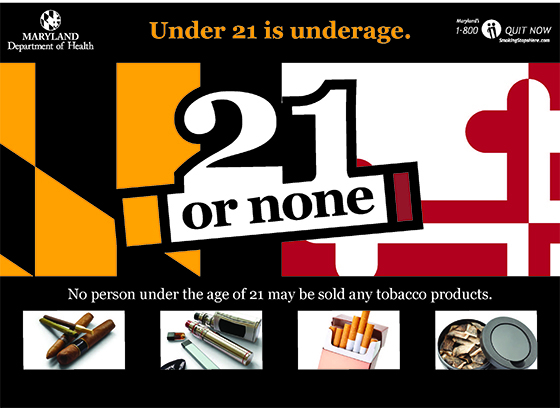Smoking, Vaping & COVID-19
- The CDC has identified smokers as a group of people at higher risk for severe illness if they contract COVID-19.
- People who smoke were 2.4 times more likely to have severe symptoms from COVID-19 compared to those who did not smoke.
- Research from Stanford University shows teens and young adults who have vaped may be up to five times more likely to test positive for the virus than their non-vaping peers

What you should know:

- Electronic cigarettes – or e-cigarettes — are also called vapes, e-hookahs, vape pens, and electronic smoking devices (ESDs).
- Using an e-cigarette product is commonly called vaping.
- E-cigarettes work by heating a liquid to produce an aerosol that users inhale into their lungs.
Electronic Smoking Devices (ESDs) have:
- Chemicals that can cause lung disease and possibly death
- Nicotine that is addictive and can damage the developing brain
- Liquids that can contain: THC and cannabinoid (CBD) oils, and other substances and additives.
- As of February 2020, a total of 2,807 hospitalized EVALI cases or deaths have been reported to CDC from all 50 states, the District of Columbia, and two U.S. territories (Puerto Rico and U.S. Virgin Islands).
- Note: Since the COVID-19 outbreak and pandemic, the reporting and tracking of EVALI cases and deaths have been suspended.
- EVALI symptoms are similar to COVID-19 symptoms, including: Cough, shortness of breath, or chest pain, nausea, vomiting, diarrhea, and fatigue.
- If you have recently used an e-cigarette or vaping product and you have any symptoms above, please see a healthcare provider.
- CDC and FDA recommend that people not use THC-containing e-cigarette, or vaping, products, particularly from informal sources like friends, family, or in-person or online dealers.
- Vitamin E acetate should not be added to any e-cigarette, or vaping, products.
- If you are an adult who used e-cigarettes to quit cigarette smoking, do not return to smoking cigarettes, weigh all available information and consider using FDA-approved smoking cessation medication.
- E-cigarette, or vaping, products (nicotine- or THC-containing) should never be used by youths, young adults, or women who are pregnant.
- Quick Facts on the Risks of E-cigarettes for Kids, Teens and Young Adults
- CDC - For the Public - What You Need to Know
- CDC - For Healthcare Providers
For Teens:
- Visit www.teenhealthmatters.org for information and resources
How to Quit
- Maryland Tobacco Quitline - 1-800-QUIT-NOW (1-800-784-8669) FREE help with quitting
- Howard County Health Department-Tobacco Education Programs - 410-313-6265
National and Local Age for Sales of Tobacco Products and Electronic Smoking Devices is Raised to 21
On Dec. 6, 2019, Howard County increased the tobacco sales age from 18 to 21 years.
On Dec. 20, 2019, the President of the United States signed legislation amending the Federal Food, Drug, and Cosmetic Act, and raising the federal minimum age of sale of tobacco products from 18 to 21 years. It is now illegal for a retailer to sell any tobacco product—including cigarettes, cigars and e-cigarettes—to anyone under 21. There is NO MILITARY EXEMPTION and no grandfathering clause.
The Health Department has programs designed to help people of all ages to quit smoking or vaping. Visit our Tobacco Sales Enforcement Program to Prevent Youth Access to Tobacco webpage for more information about helping teens and young adults quit smoking/vaping.
You can find additional information about quitting tobacco at www.SmokingStopsHere.com.
For more information go the Maryland Department of Health's T21 webpage here.